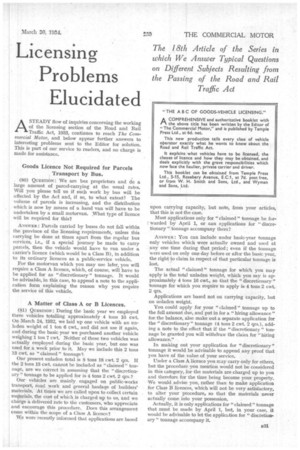Licensing Problems Elucidated
Page 37

If you've noticed an error in this article please click here to report it so we can fix it.
The 18th Article of the Series in which We Answer Typical Questions on Different Subjects Resulting from the Passing of the Road and . Rail Traffic Act
ASTEADY flow of inquiries concerning the working of the licensing section of the Road and Rail Traffic Act, 1933, continues to reach The Commercial Motor, and below appear further answers to interesting problems sent to the Editor for solution. This is part of our service to readers, and no charge is made for assistance.
Goods Licence Not Required for Parcels Transport by Bus.
(80) QUESTION: We are bus proprietors and do a large amount of parcel-carrying at the usual rates. Will you please tell us if such work by bus will be affected by the Act and, if so, to what extent? The volume of parcels is increasing, and the distribution which is now by means of a hand van will have to be undertaken by a small motorvan. What type of licence will be required for this?
ANSWER: Parcels carried by buses do not fall within the province of the licensing requirements, unless this carrying be done at times apart from the regular bus services, i.e., if a special journey be made to carry parcels, then the vehicle would have to run under a carrier's licence (which would be a Class B), in addition to its ordinary licences as a public-service vehicle.
For the motorvan which you may use later, you will require a Class A licence, which, of course, will have to be applied for as " discretionary " tonnage. It would be advisable, in this case, to append a note to the application form explaining the reason why you require the service of this vehicle.
A Matter of Class A or B Licences.
(81) QUESTION: During the basic year we employed three vehicles totalling approximately 4 tons 16 cwt. On March 24, 1932, we laid up one vehicle with an unladen weight of 1 ton 6 cwt., and did not use it again, and during the basic year we purchased another vehicle weighing 1 ton 7 cwt. Neither of these two vehicles was actually employed during the basic year, but one was used for a week prior to it. May we include this 2 tons 13 cwt. as " claimed " tonnage?
Our present unladen total is 8 tons 18 cwt. 2 qrs. If the 2 tons 13 cwt. cannot be included as "claimed" tonnage, are we correct in assuming that the " discretionary " tonnage to be applied for is 4 tons 2 cwt. 2 qrs.?
Our vehicles are mainly engaged on public-works transport, road work and general haulage of builders' materials. At times we are called upon to collect certain materials, the cost of which is charged up to us, and we charge a delivered rate to the customers, who appreciate and encourage this procedure.. Does this arrangement come within the scope of a Class A licence?
We were recently informed that applications are based upon carrying capacity, but note, from your articles, that this is not the case.
Must applications only for " claimed " tonnage be for; warded by April 1, or can applications for " discretionary " tonnage accompany them?
ANSWER: You can include under basic-year tonnage only vehicles which were actually owned and used at any one time during that period ; even if the tonnage were used on only one day before or after the basic year, the right to claim in respect of that particular tonnage is lost.
The actual " claimed " tonnage for which you may apply is the total unladen weight, which you say is approximately 4 tons 16 cwt., so that the " discretionary " tonnage for which you require to apply is 4 tons 2 cwt. 2 qrs.
Applications are based not on carrying capacity, but on unladen weight.
You could apply for your " claimed " tonnage up to the full amount due, and put in for a "hiring allowance" for the balance, also make out a separate application for the " discretionary " tonnage (4 tons 2 cwt. 2 qrs.), adding a note to the effect that if the " discretionary " tonnage be granted you will withdraw the claim for "hiring allowance."
In making out your application for " discretionary " tonnage it would be advisable to append any proof that you have of the value of your service.
Under a Class A licence you may carry only for others, hut the procedure you mention would not be considered in this category, for the materials are charged up to you and therefore for the time being become your property. -We would advise you, rather than to make application for Class B licences, which will not be very satisfactory, to alter your procedure t so that the materials never actually come into your possession.
Actually, it is only applications for "claimed" tonnage that must be made by April 1, but, in your case, it would be advisable to let the application for " discretionary " tonnage accompany it.












































































